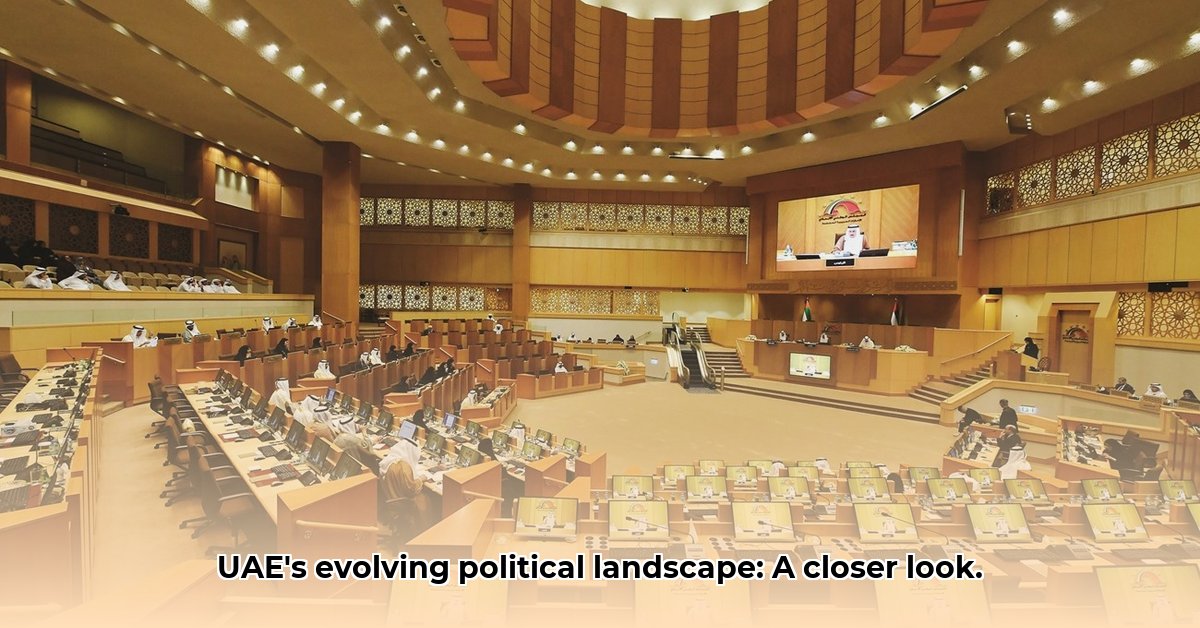The United Arab Emirates’ Federal National Council (FNC) stands as a unique institution, reflecting the nation’s evolving approach to governance. Bridging traditional Emirati consultation practices (Shura) with modern parliamentary concepts, the FNC’s development offers a compelling case study in political evolution. Learn more about evolutionary processes here. This article examines the FNC’s journey, its current role, its impact on policy, and its future prospects within the UAE’s political landscape.
From Appointment to Hybrid Representation: A Gradual Opening
The FNC’s initial structure, established in 1972, consisted entirely of members appointed by the rulers of the seven emirates. This approach mirrored the long-standing tradition of Shura, where leaders consulted with advisors before making decisions. However, as the UAE modernized, a desire for greater citizen participation emerged. A significant shift occurred in 2006, with the introduction of a hybrid system combining appointed and indirectly elected members. This reform marked a pivotal step towards greater inclusivity, reflecting a national commitment to incorporating public voices in the decision-making process. This blend of tradition and modernity offers a unique perspective on political development, showcasing the UAE’s adaptable approach to governance.
The Electoral College System: Expanding Participation, Debating Representation
The indirect election process, utilizing electoral colleges, represents a distinctive aspect of the FNC’s structure. Each emirate forms its own electoral college, whose members are selected by the respective Ruler. These colleges then nominate and elect a portion of the FNC representatives. While this system provides a broader base for citizen involvement compared to the purely appointed model, it also sparks debate about the extent of true representation. Critics argue that the indirect nature of the election dilutes the direct expression of the public will, while proponents highlight the system’s role in expanding participation within the existing political framework.
The growth of the electoral colleges themselves demonstrates a clear trend toward increased involvement. From approximately 6,595 electors in 2006 to over 337,000 in 2019, the expansion of these bodies signifies a commitment to incorporating more citizen voices into the selection process. This growth raises important questions about the evolving relationship between the public, the electoral colleges, and the FNC itself. How does this expansion translate into influence on policy? Does a larger electoral college enhance the representativeness of the FNC? Further research is needed to fully understand the impact of this expansion on the FNC’s effectiveness and legitimacy.
Amplifying Women’s Voices: A Milestone in Representation
The UAE has made remarkable strides in promoting female representation within the FNC. In 2019, the nation achieved the ambitious goal of 50% female representation, a significant milestone that places the UAE among global leaders in gender parity within government. This achievement not only reflects a commitment to inclusivity but also holds the potential to reshape policy discussions and outcomes. Increased female representation raises crucial questions about the impact of diverse perspectives on legislative priorities and the potential for policies that better address the needs of all segments of society.
Advisory Influence: Shaping Policy Through Consultation and Recommendations
The FNC’s primary role is advisory. It reviews proposed legislation, examines the annual budget, discusses international treaties, and offers recommendations to the executive branch. While the FNC does not possess independent lawmaking power, its input plays a crucial role in shaping policy discussions and informing government decisions. This advisory function allows the FNC to contribute to the national discourse, raise public concerns, and offer expert insights on a wide range of issues. Examining the FNC’s recommendations and their subsequent incorporation into government policy provides valuable insights into the body’s effectiveness in influencing the direction of national affairs.
Transparency and Public Engagement: Building Trust and Strengthening Accountability
Enhancing transparency and public engagement are essential for strengthening the FNC’s connection with the citizenry and ensuring its continued relevance. While the FNC’s sessions are generally open to the public, opportunities for greater public understanding of its activities and increased accessibility to information can further strengthen its legitimacy and build public trust. Effective communication strategies, public forums, and online platforms can facilitate greater interaction between the FNC and the public, fostering a more robust and informed dialogue on national issues.
The FNC’s Future Trajectory: Towards Greater Influence and Responsiveness
The FNC’s evolution is an ongoing process. Its future trajectory depends on continuous dialogue, collaboration between its members and the executive branch, and a sustained commitment to incorporating citizen voices. As the UAE continues to develop its political landscape, the FNC has the potential to play an increasingly influential role in shaping national policy and representing the diverse interests of the Emirati population. Its continued development will require ongoing adaptation, innovation, and a responsiveness to the evolving needs and aspirations of the nation.










